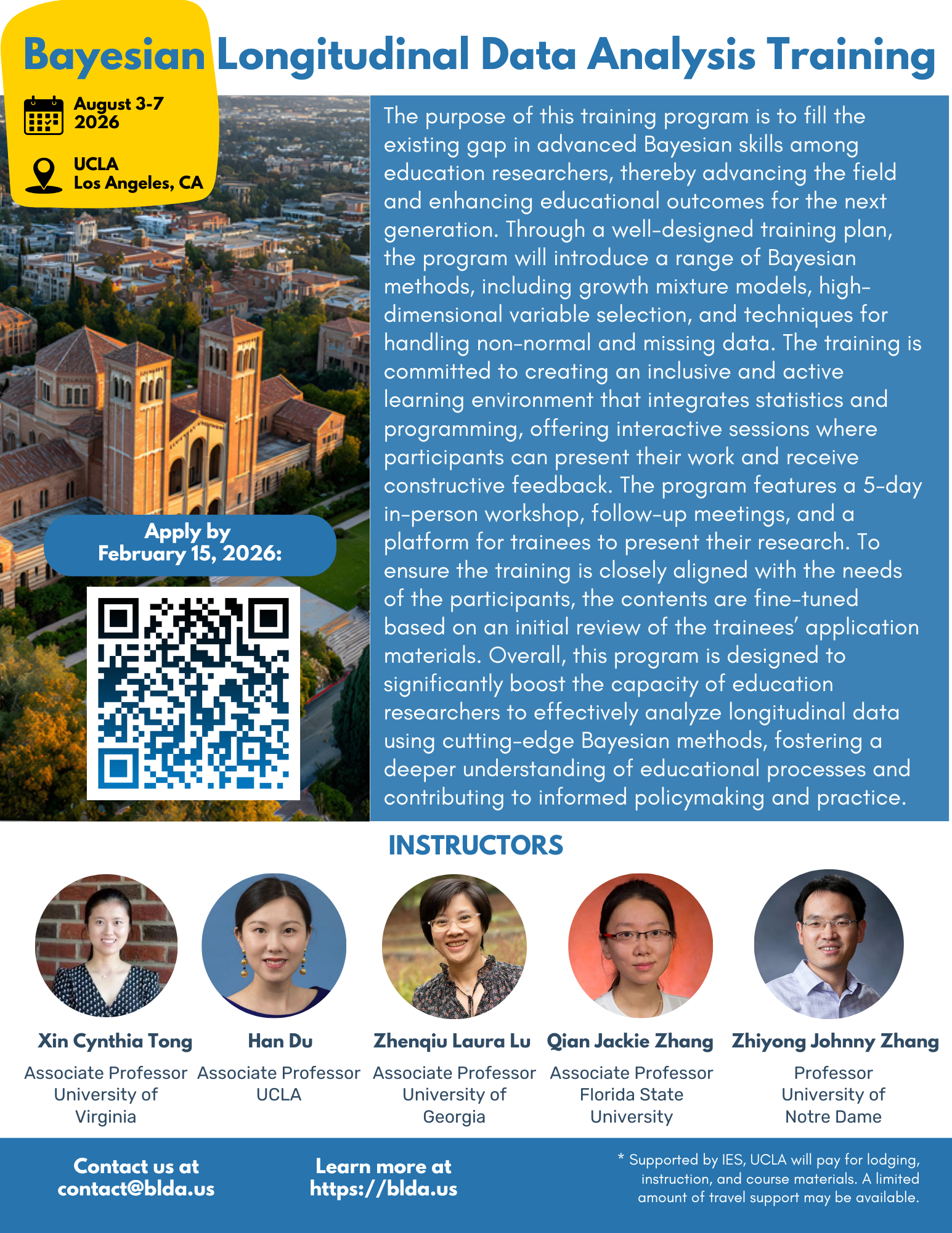About the Training
Supported by the Institute of Education Sciences, we are conducting a five-day training on Bayesian Longitudinal Data Modeling in Education Sciences in the summer of 2025, 2026 and 2027 at the University of Virginia, UCLA, and Florida State University, respectively.
The purpose of this training program is to fill the existing gap in advanced Bayesian skills among education researchers, thereby advancing the field and enhancing educational outcomes for the next generation. Through a well-designed training plan, the program will introduce a range of Bayesian methods, including growth mixture models, highdimensional variable selection, and techniques for handling non-normal and missing data. The training is committed to creating an inclusive and active learning environment that integrates statistics and programming, offering interactive sessions where participants can present their work and receive constructive feedback. The program features a 5-day in-person workshop, follow-up meetings, and a platform for trainees to present their research. To ensure the training is closely aligned with the needs of the participants, the contents are fine-tuned based on an initial review of the trainees’ application materials. Overall, this program is designed to significantly boost the capacity of education researchers to effectively analyze longitudinal data using cutting-edge Bayesian methods, fostering a deeper understanding of educational processes and contributing to informed policymaking and practice.
Instructors
-

Cynthia Tong -- University of Virginia
Dr. Tong is an associate professor at the University of Virginia. Her research focuses on developing and applying statistical methods in the areas of developmental and health studies. Methodologically, she is interested in Bayesian methodology, growth curve modeling, and robust structural equation modeling with nonnormal and missing data. Substantively, she is interested in analyzing the longitudinal development of cognitive ability and achievement skills.
-

Han Du -- University of California, Los Angeles
Dr. Han Du is an associate professor at the University of California, Los Angeles. Her methodological interests have evolved along three inter-related lines: (1) Bayesian methods and statistical computing; (2) longitudinal data analysis and time series analysis; and (3) study design and sample size determination. She also works on developing new meta-analysis and machine learning techniques. From a substantive perspective, she is interested in applying quantitative methods in developmental, clinical, cognitive, educational, and health research.
-

Laura Lu -- University of Georgia
Dr. Laura Lu is an associate professor in the Quantitative Methodologies (QM) program at the University of Georgia (UGA). In general, she has expertise in structural equation modeling (SEM), longitudinal data analysis, hierarchical linear modeling (HLM), and computational statistics such as Bayesian. During her professional career at UGA, her research has focused on developing innovative statistical approaches to address perennial challenges in statistical modeling such as mixture structure, reliabilities, model selection, missing data, outliers, topic modeling, and also promoting statistical models to applied research areas through collaborating, mentoring, and classroom teaching.
-

Qian Zhang -- Florida State University
Dr. Qian (Jackie) Zhang is an associate professor in the Department of Educational Psychology and Learning Systems at Florida State University. Her research interests focus on causal inferences, longitudinal data analysis, and effect size synthesis using multilevel models and multilevel structural equation models. She is also interested in handling sub-optimal data conditions with missing data, measurement error, and/or confounding variables in statistical analyses. She collaborates with substantive researchers in the areas of early childhood development, sports psychology, and educational research. Her work has been published in prestigious journals such as Psychological Methods, Multivariate Behavioral Research, Structural Equation Modeling, British Journal of Mathematical and Statistical Psychology, and Behavioral Research Methods.
-

Johnny Zhang -- University of Notre Dame
Dr. Johnny Zhang is a professor in Quantitative Psychology at the University of Notre Dame. His research aims to develop better statistical methods and software in the areas of education, health, management and psychology. He has conducted research in the areas of Bayesian methods, Big data analysis, Structural equation modeling, Longitudinal data analysis, Mediation analysis, and Statistical computing and programming. His most recent research involves the development of new methods for social network and text analysis.
Application for the 2026 Training in Los Angeles
Application Form
Eligibility
Applicants must be citizens or non-citizen nationals of the United States, or must have been lawfully admitted to the United States for permanent residence (i.e., possess a currently valid Alien Registration Receipt Card I-551, or other legal verification of such status).
Preference will be given to individuals who have demonstrated their ability to conduct independent research and can demonstrate that they have a need for the knowledge and skills addressed in the training. Each application will be evaluated on its own merits. If more than 15 meritorious applications are received, other criteria such as disciplinary, geographical, and institutional diversity will be taken into account. Those who are not selected for this year's training will be given priority for future training opportunities.
Applicants must have a good understanding of statistical methods and be experienced in using personal computers and statistical computer packages. The training will include hands-on data analysis sessions. Participants are expected to know how to perform basic statistical analysis, including running statistical analyses (e.g., frequency distributions, cross-tabulations, means, regression analyses).
Women, minorities, and individuals with disabilities are strongly encouraged to apply.
Senior graduate students, postdoctoral fellows, junior researchers, and senior researchers who would benefit from the knowledge and skills addressed in the training Institute are encouraged to apply.
If selected for participation in the training, individuals who require accommodations for disabilities should contact Cynthia Tong at University of Virginia (e-mail: contact@blda.us).
Cost and Financial Support
Supported by IES, University of Virginia will pay for lodging, instruction, and course materials. A limited amount of travel support is available for special situations where a participant is accepted but lacks funding or for participants from school districts and state government.
Application Process
The 2026 training will be offered August 3-7, 2026. If you are interested in attending the training, please complete the online application form. It will require you to submit a copy of your curriculum vitae.
Your curriculum vitae should include information on:
⦿ Your current title/position at your institution or organization
⦿ Your academic/professional degree(s)
⦿
Your citizenship status (citizen or permanent resident)
⦿
A list of your publications and currently funded research grants
The deadline for applications is February 15, 2026. Applicants will be notified of placement via e-mail by the end of March 2026.
Contact information
Email: contact@blda.us or blda2024ies@gmail.com
Join our mailing list
You can join our mailing list to receive information on the training.
Share the training
You can share the training information with a colleague by inputting their email and name below.

Sponsors
The training is funded by the Institute of Education Sciences of the US Department of Education.
⦿
Institute of Education Sciences
⦿
University of Virginia
⦿
University of California, Los Angeles
⦿
Florida State University
⦿
University of Notre Dame
⦿
University of Georgia